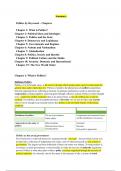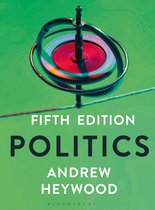Summary
Politics by Heywood – Chapters
Chapter 1: What is Politics?
Chapter 2: Political Ideas and Ideologies
Chapter 3: Politics and the State
Chapter 4: Democracy and Legitimacy
Chapter 5: Governments and Regimes
Chapter 6: Nations and Nationalism
Chapter 7: Globalization
Chapter 8: Politics, Society and Identity
Chapter 9: Political Culture and the Media
Chapter 18: Security: Domestic and International
Chapter 19: The New World Order
Chapter 1: What is Politics?
Defining Politics
Politics, is in its broader sense, is the activity through which people make, preserve and amend the
general rules under which they live. Politics is linked to the phenomena of conflict (competition
between opposing forces, reflecting a diversity of opinions, preferences, needs or interests) and
cooperation (working together; achieving goals through collective action). Politics is better thought
of as a search for conflict resolution than at its achievement, as not all conflicts are, or can be,
resolved. Nevertheless, the inescapable presence of diversity (we are not all alike) and scarcity
(there is never enough to go around) ensures that politics is an inevitable feature of the human
condition.
Politics as an arena (a sphere of Politics as a process
intense political activity)
Definitions of politics The art of government Compromise and consensus Power
Public affairs and the distribution of resources
Approaches to the study of Behaviouralism Feminism
politics Rational-choice theory Marxism
Institutionalism Post-positive approaches
Politics as the art of government
The word politics is derived from polis, meaning literally ‘city-state’. Ancient Greek society was
divided into a collection of independent city-states, each of which possessed its own system of
government. The largest and most influential of these city-states was Athens. To study politics is,
in essence, to study government, or more broadly, to study the exercise of authority (legitimate
power). Politics is what takes place within a polity (a society organized through the exercise of
political authority; for Aristotle, rule by the many in the interests of all), a system of social
,organization centred on the machinery of government. Politicians are often seen as power-seeking
hypocrites who conceal personal ambition behind the rhetoric of public service and ideological
conviction. Anti-politics is rooted in a view of politics as a self-serving, two-faced and
unprincipled activity, clearly evident in the use of derogatory phrases such as ‘office politics’ and
‘politicking’. > This image can be traced back to the writings of Machiavelli (1469-1527), who
wrote; The Prince. The adjective Machiavellian came to mean ‘cunning and duplicitous’.
Without some kind of mechanism (politics) for allocating authoritative values, society would simply
disintegrate into a civil war of each against all, as the early social-contract theorists argued. The task
is therefore not to abolish politicians and bring politics to an end but, rather, to ensure that politics is
conducted within a framework of checks and constraints that guarantee that governmental power is
not abused.
Politics as public affairs
In Politics, Aristotle declared that ‘man is by nature a political animal’, by which he meant that it is
only within a political community that human beings can live the ‘good life’. From this viewpoint,
then, politics is an ethical activity concerned with creating a ‘just society’; it is what Aristotle
called the ‘master science’. The institutions of the state (the apparatus of government, the courts,
the police, the army, the social security system, and so forth) can be regarded as ‘public’ in the
sense that they are responsible for the collective organization of community life. Moreover, they are
funded at the public’s expense, out of taxation. In contrast, civil society consists of what Edmund
Burke called the ‘little platoons’, institutions and such as the family and kinship groups, private
businesses, trade unions, clubs, community groups, that are ‘private’ in the sense that they are set
up and funded by individual citizens to satisfy their own interests, rather than those of the larger
society. An alternative ‘public/private’ divide is sometimes defined in terms of a further and more
subtle distinction; namely, that between ‘the political’ and ‘the personal’. According to this
perspective, politics does not, and should not, infringe on ‘personal’ affairs and institutions.
The notion that politics should exclude ‘the personal’ has nevertheless been challenged by feminist
thinkers. Not only does this in effect exclude women from politics, but, as radical feminists in
particular argue, it excludes from political analysis the core processes through which male
domination and female subordination are brought about. These include conditioning within the
family (the process through which boys and girls are encouraged to conform to contrasting
stereotypes of ‘masculinity’ and ‘femininity’), the distribution of housework and other domestic
responsibilities, and the politics of personal and sexual conduct.
Public Private
The state: Civil society:
Apparatus of government Autonomous bodies – businesses, trade unions,
clubs, families and so on
Public Private
Public realm: Personal realm:
Politics, commerce, work, art, culture and so on Family and domestic life
According to Hannah Arendt (1906-1975) politics is the most important form of human activity
because it involves interaction amongst free and equal citizens (The Human Condition). It thus
gives meaning to life and affirms the uniqueness of each individual. In John Stuart Mill’s view,
involvement in ‘public’ affairs is educational, in that it promotes the personal, moral and
intellectual development of the individual.
, In sharp contrast, however, politics as public activity has also been portrayed as a form of unwanted
interference. This is most clearly demonstrated by attempts to narrow the realm of ‘the political’,
commonly expressed as the wish to ‘keep politics out of’ private activities such as business, sport
and family life.
Politics as compromise and consensus
Politics is seen as a particular means of resolving conflict: that is, by compromise, conciliation and
negotiation, rather than through force and naked power. In the view of Bernard Crick (1962), the
key to politics is a wide dispersal of power. In other words, the disagreements that exist can be solved
without resort to intimidation and violence. (= this model has little to tell about one-party states or
military regimes).
Politics as power
The fourth definition of politics is both the broadest and the most radical. Rather than confining
politics to a particular sphere (the government, the state or the ‘public’ realm), this view sees politics
at work in all collective social activity, formal and informal, public and private, in all human
groups, institutions and societies’.
‘Faces’ of power:
● Power as decision-making
● Power as agenda setting
● Power as thought control
At its broadest, politics concerns the production, distribution, and use of resources in the course of
social existence. Politics is, in essence, power: the ability to achieve a desired outcome, through
whatever means. This notion was summed up in the title of Harold Laswell’s book Who Gets What,
When, How? (1936). From this perspective, politics is about diversity and conflict, but the essential
ingredient is the existence of scarcity: the simple fact that, while human needs and desire are infinite,
the resources available to satisfy them are always limited. Politics can therefore be seen as a struggle
of scarce resources, and power can be seen as the means through which this struggle is conducted.
Advocates of the view of politics as power include feminists and Marxists. Not only have feminists
sought to expand the arenas I which politics can be seen to take place, a notion most boldly asserted
through the radical feminist slogan ‘the personal is the political’, but they have also tended to view
politics as a process, specifically one related to the exercise of power over others. Marxists can be said
to believe that ‘the economic is political’. From this perspective, civil society, characterized as
Marxists believe it to be by class struggle, is the very heart of politics.
Studying politics
One of the most ancient spheres of intellectual enquiry, politics was originally seen as an arm of
philosophy, history or law. Its central purpose was to uncover the principles on which human society
should be based. There are a couple different approaches to the study of politics.
The philosophical tradition
The origins of political analysis date back to Ancient Greece and a tradition usually referred to as
‘political-philosophy’. This involved a preoccupation with essentially ethical, prescriptive or
normative (what ‘should be’ rather than what ‘is’) questions, reflecting a concern with what ‘should’,
‘ought’ or ‘must’ be brought about, rather than what ‘is’. Plato (427-347 BCE) and Aristotle are
usually identified as the founding fathers of this tradition. This is also called the ‘traditional’
, approach, which involves analytical study of ideas and doctrines that have been central to political
thought. This approach focuses on the ‘major’ thinkers. Hereby, this approach cannot be objective in
any scientific sense, as it deals with normative questions.
The empirical tradition
Although it was less prominent than normative theorizing, a descriptive or empirical (based on
observation and experiment) tradition can be traced back to the earliest days of political thought. The
empirical approach to political analysis is characterized by the attempt to offer a dispassionate and
impartial account of political reality. The approach is ‘descriptive’, in that it seeks to analyse and
explain, whereas the normative approach is ‘prescriptive’, in the sense that it makes judgements and
offers recommendations. Descriptive political analysis acquired its philosophical underpinning from
the doctrine of empiricism, which spread from the 17th century onwards through the work of theorists
such as John Locke and David Hume (17111776). The doctrine of empiricism advanced the belief
that experience is the only basis of knowledge and that, therefore, all hypotheses and theories should
be tested by a process of observation. By the 19th century, such ideas had developed into what became
known as ‘positivism’, an intellectual movement particularly associated with the writings of Auguste
Comte (1798-1857).
Behaviouralism
Since the mid-nineteenth century, mainstream political analysis has been dominated by the ‘scientific’
tradition, reflecting the growing impact of positivism. Enthusiasm for a science of politics peaked in
the 1950s and 1960s with the emergence, most strongly in the USA, of a form of political analysis that
drew heavily on behaviouralism (the belief that social theories should be constructed only on the
basis of observable behaviour, providing quantifiable data for research. Political analysts such as
David Easton (1979, 1981) proclaimed that politics could adopt the methodology of the natural
sciences, and this gave rise to a proliferation of studies in areas best suited to the use of quantitative
research methods, such as voting behaviour, the behaviour of legislators, and the behaviour of
municipal politicians and lobbyists. It was claimed that behaviouralism had significantly constrained
the scope of political analysis, preventing it from going beyond what was directly observable.
Dissatisfaction with behaviouralism has grown as interest in normative questions has revived since the
1970s, as reflected in the writings of theorists such as John Rawls and Robert Nozick.
Rational-choice theory
Amongst recent theoretical approaches to politics is what is called ‘formal political theory’, variously
known as ‘rational-choice theory’, ‘public-choice theory’ and ‘political economy’. This approach to
analysis draws heavily on the example of economic theory in building up models based on procedural
rules, usually about the rationally self-interested behaviour of the individuals involved. The
best-known example in game theory is the ‘prisoners’ dilemma. Game theory (a way of exploring
problems of conflict or collaboration by explaining how one actor’s choice of strategy affects
another’s best choice and vice versa). has been used by IR theorists to explain why states find it
difficult to prevent, for instance, the overfishing of the seas, or the scale of arms to undesirable
regimes. By no means, however, has the rational choice approach to political analysis been universally
accepted.
New institutionalism





